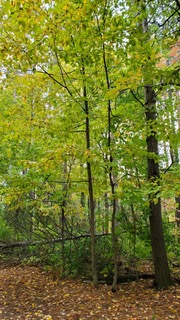by Lois Scott, Master Gardener
This year the overstory (forest canopy) was clearly a showstopper. The beautiful fall colour can certainly outshine the understory that grows beneath, however the understory has its own beauty and this is where the greatest diversity is found. The understory is comprised of the vegetation that grows beneath the canopy including “seedlings and saplings of canopy trees together with specialist understory trees, shrubs and herbs”. https://en.wikipedia.org/wiki/Understory
In our urban landscape a natural understory can be largely missing, particularly in our urban gardens. In my own garden, along with an increasing number of native herbs and shrubs I have included a few native, “specialist” understory trees to increase diversity. They grow well in the shade of neighbouring canopy trees, will all tolerate urban conditions and are worthy substitutes to many for the non-native horticultural varieties.
Blue Beech: Carpinus caroliniana aka American Hornbeam, Ironwood, Musclewood
This tree has a blue tinged bark that is hard and smooth with a sinewy appearance. It grows up to 8 metres high with a low and spreading habit. It prefers deep, rich moist soils and will tolerate some flooding. Although is prefers shade it will tolerate full sun with enough moisture. Squirrels and birds will eat the seeds and flowers. The leaves turn a beautiful reddish copper colour in the fall. Mammals avoid browsing twigs and branches due to their unpalatable taste.

Ironwood: Ostrya virginiana aka Hop-Hornbeam
Although the Ironwood tree shares a similar common name to the Blue Beech these are two distinct trees. The Ironwood grows up to 12 metres with a wide spreading crown and long slender branches. It is very adaptable and will grow in full sun to full shade. It prefers well drained to slightly dry soils and is an excellent tree for an urban area.

Pagoda Dogwood: Cornus alternifolia
The Pagoda Dogwood is a small graceful tree with a flat, layered appearance growing up to 10 metres. It prefers moist, well drained soil. It has beautiful white fluffy spring flowers that mature into blue, berry like fruits that are attractive to a wide variety of birds. It is also a butterfly larval host.
Canadian Serviceberry: Amelanchier canadensis
The Canadian Serviceberry grows up to 8 metres. It bears elongated clusters of white showy flowers in spring followed by red berries that birds devour. It is drought tolerant and will grow in both shade and sun.
https://www.greenup.on.ca/wp-content/uploads/2019/05/2019May15_EcologyParkCatalogueMasterDraft.pdf
https://www.yourleaf.org/blog/jen-vander-vecht/jul-15-2015/seeing-understory-through-trees

Great to know! We have a wonderful overstory of red maple, silver maple and a few conifers. Besides existing solomon seal, hellebores, hosta and Sweet Woodruff, I’ll look for a shrub that can tolerate shade and drier land.
LikeLike